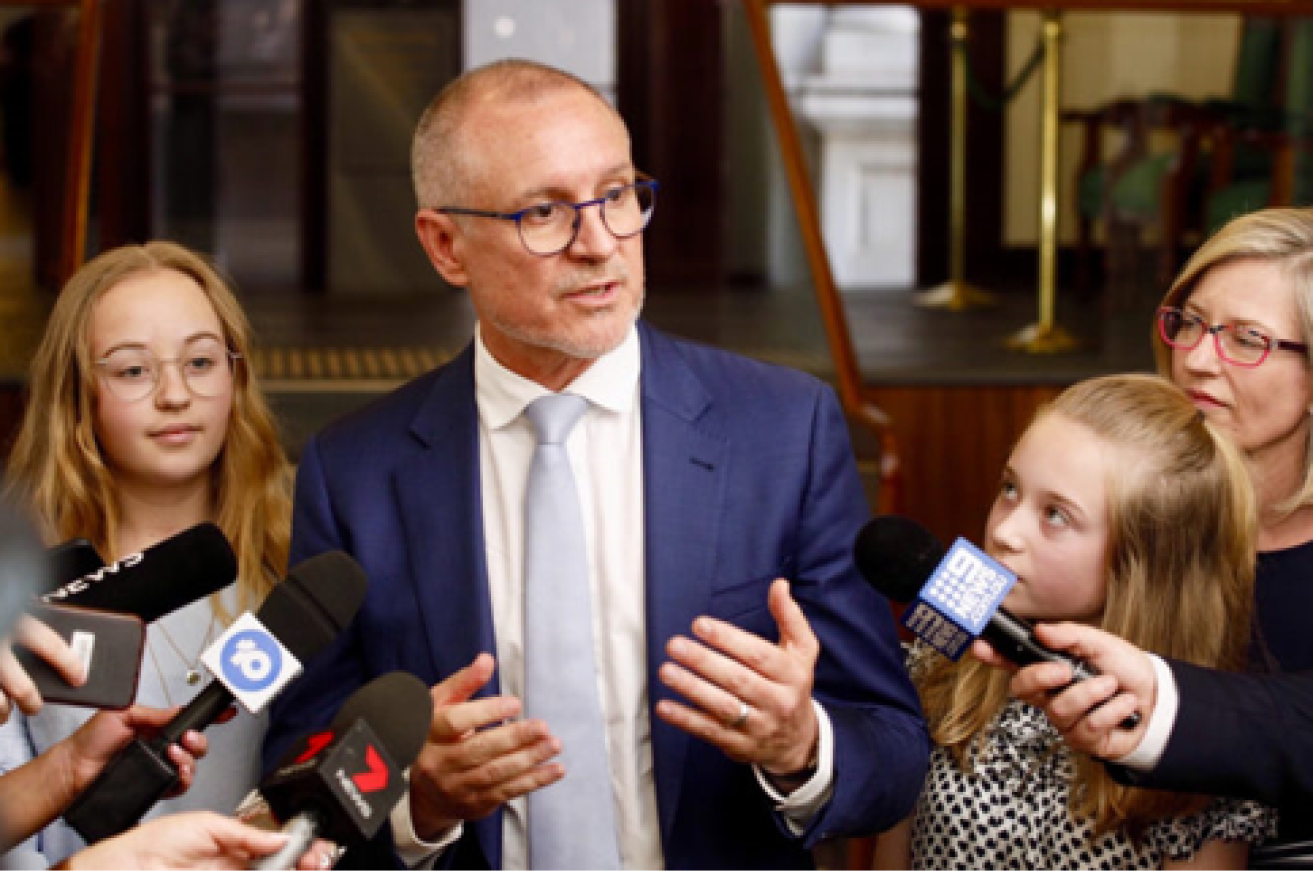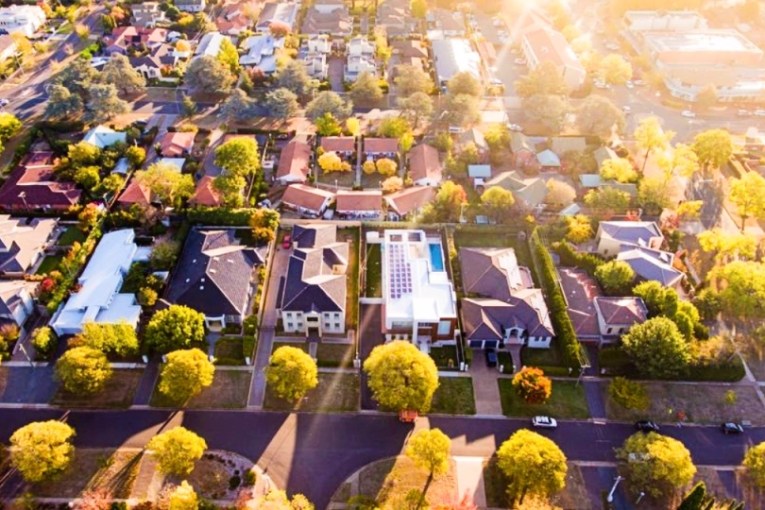Former SA premier Jay Weatherill bails out of politics

Former SA premier Jay Weatherill gathers his children around him while announcing his retirement from politics. Photo: InDaily
Former South Australian Premier Jay Weatherill will retire from politics, confirming on Thursday morning it was “time to hand on the baton”.
The decision to resign from parliament “before the end of the year” will prompt a by-election in his safe seat of Cheltenham – where union boss Joe Szakacs is a frontrunner to succeed him – and will fuel already intense speculation about the future intentions of his former deputy John Rau, who has not responded to inquiries.
“I really feel like I’ve run my race,” Weatherill told InDaily this morning, before he confirmed the decision to Parliament.
It’s a swift reversal from his assurance after Labor’s March election loss that he would serve a full four-year term, but the former Premier – who replaced Mike Rann in 2011 – noted the decision was “probably best for the party and best for me”.
“Politics is about the future… I expected to stay – but as time goes on, you just reflect on the contribution you can make,” he said.
“I can’t see myself running around in 2022… that then starts to raise the question about if you’re not going to be there, and the party’s thinking about renewal and regeneration – should you hand the baton on?”
JAY RETIRES: Former Premier Jay Weatherill has announced his retirement from politics. He's thanked the "salt of the earth" people in his electorate for making his community a joy to live in and represent. #10NewsFirst pic.twitter.com/68JSichLJf
— 10 News First Adelaide (@10NewsFirstAdl) December 6, 2018
He said time with his immediate and extended family was also a consideration, as well as the realisation that “nobody quite knows what to do with an ex-leader” – that his every utterance, positive or negative, would impact on his successor Peter Malinauskas, while his silence was similarly scrutinised.
“If you’re a political person, you’re sort of either in the game or you’re not,” he said.
“And your voice is your political asset … but if you use it, it can be quite unhelpful for your current leader – as we’ve seen nationally.”
And the national political stage, he insists, holds no allure for the former ALP leader who made an art of feuding with the federal coalition.
“I have no interest in it,” he said of a possible federal shift.
He admitted he “probably would have been open to it” at the beginning of his career, when his choice for state politics was prompted in part by family considerations.
But now, he says, federal politics is “a worthy thing, and all power to those that do it … but I couldn’t think of anything worse”.
“I don’t like the culture and the dynamic of federal politics,” he said.
Weatherill says issues of child protection and the Oakden scandal represent his biggest regret in politics, “the things that happened to vulnerable people – children and old people – who really needed the protection of the state”.
“And we let them down,” he said.
“That’s a source of enormous sadness and regret… and you always ask yourself if there’s things you could have and should have done better.”
His premiership was defined in part, he says, by “three massive economic changes” that happened soon after his ascension – the decision to halt the BHP Billiton Olympic Dam expansion, a “catastrophic collapse in revenues” in the aftermath of the GFC and the announcement of the closure of Holden.
He says the decision his government took – including being prepared to sacrifice the AAA credit rating to continue infrastructure spending – were “moments of truth”.
He lists Labor’s response to various crisis points – on the Future Submarines, Port Pirie, Whyalla and the 2016 statewide blackout – as “decisions that altered the course of SA’s economic future”.
“There were really critical decision points,” he said.
While the subs spend has been a local boon for the federal Liberals, the state government ran a concerted campaign pushing for an SA build.
“I had a one on one with the prime minister at the time, Tony Abbott, and he said ‘settle for the Frigates – the subs are gone’,” Weatherill recalled.
“And we didn’t – we had to resist and campaign against the federal government.”
Labor’s response to the 2016 blackout – which could have killed his administration – instead almost saved it, and helped define SA internationally as a renewable energy hub with the construction of the Tesla-built ‘big battery’.

Billionaire Elon Musk faced the fury of voters after the big blackout, but his “big battery” deal with Elon Musk turned things around.with SA Premier Jay Weatherill. Photo: ABC
Weatherill says the fact the national press is carrying news of a report by engineering and advisory firm Aurecon “about how wonderful the big battery is” was “satisfying”.
“We were ridiculed nationally … and that’s a source of great satisfaction to be vindicated,” he said.
“These were things that could have gone one way or another.”
One that went ‘the other’ way was the abandoned push for nuclear waste storage, but Weatherill says it was a move prompted by economic necessity.
“In that context, we had to ask ourselves: ‘What do we have? What are our resources and our opportunities?’
Sad to hear @JayWeatherill is leaving politics. The competition for best Labor Premier of all time is a tough one, but on behalf of South Australians, Jay gets my vote. Remember when he fired up at Frydenberg? We'll miss you Jay.https://t.co/bE8Ri4zBtj
— Victoria Fielding (@DrVicFielding) December 6, 2018
“It made sense for us to ask whether we could and should do more.”
He says he “probably learned a few things about how to manage that” public engagement process “and probably would have handled some things differently with the benefit of hindsight”.
“But I don’t apologise for exploring and questioning,” he insists.
I think we’re a better democracy… we’ve opened up the SA decision-making process
The waste dump proposal was undone, in large part, by the results of a citizens’ jury – but ironically, Weatherill maintains the process is symbolic of perhaps his proudest legacy.
“I like to think I did something about trying to involve people in decisions,” he said.
“There a sense in which I think we’re a better democracy… no man’s perfect, but I like to think we’ve opened up the SA decision-making process.
“It’s much messier when you want to involve people in decisions – you get all the anger opposition and at times not-terribly-informed criticism … but I believe in democratic debate.
“I like to think I never shied away from asking big questions.”
He put policy ahead of politics on issues that matter … you couldn’t give any greater compliment to a politician than that
Among those paying tribute to the former Labor leader today was former New South Wales Liberal Premier Mike Baird, who told Adelaide’s online InDaily news service: “I had great admiration for Jay, as a person and as a politician.”
“I think he was someone who put policy ahead of politics on issues that matter, and to me I don’t think you could give any greater compliment to a politician than that,” he said.
Baird, who took pains to emphasise he thought Liberal incumbent Steven Marshall was “doing a fantastic job”, sided with Mr Weatherill in 2015 to push for GST reform.

Jay Weatherill faced his biggest challenge when wild storms brought down power lines and plunged his state into darkness. Photo: AAP
“Jay was courageous on issues he thought were important,” he said today.
“Generally in our time at COAG it wasn’t ‘what’s your political badge?’, it was ‘let’s use this time and stewardship, let’s not just sit at the table, let’s work on policies together that can make a real change…’
“We didn’t agree on everything, but we agreed on many things.”
Mr Malinauskas said Mr Weatherill embodied a combination of mild-mannered leadership with “steely resolve”, “humility with self-belief”, and lauded his “furious commitment to the people that he cares about”.
“He combined quality public policy with considered politics,” he said.
He insisted the ALP wouldn’t take Cheltenham for granted, saying: “I’m really determined to ensure the party goes about a preselection process that ends up with the right candidate who’s committed to Labor values, committed to the local area and also committed to serving in hopefully a future Labor government.”
He said no one else had “formally” indicated they would be standing down mid-term.
“John [Rau] was Jay’s deputy for a long period of time. They’re very close … so naturally I’d have thought when someone of Jay’s stature announces his retirement, that would cause a moment’s thought forJohn … but I hope he serves his full term,” he said.
Speaker Vincent Tarzia said he was awaiting a formal letter of resignation, and would then meet with the electoral commissioner to determine a by-election date.







